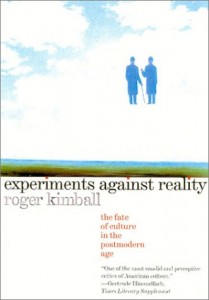 The slogan of the Enlightenment, as declared by Kant, was Sapere aude – dare to know! Our post-modernist culture has done one better, however, producing such luminaries as the celebrated academic Richard Rorty, whose motto might best be summed up as “dare not to know!” Here, for example, is Rorty expressing astonishment that descendants of Kant still exist: “You can still find philosophy professors who will solemnly tell you that they are seeking the truth, not just a story or a consensus but an honest-to-God, down-home, accurate representation of the way the world is!” Kant, you see, presupposed there was an external world to know, objective facts to be learned. In the Kantian framework, art, literature and philosophy are methods of grappling and coming to terms with reality; in the postmodernist paradigm, art, literature and philosophy are hopelessly subjective. Roger Kimball’s Experiments Against Reality: The Fate of Culture in the Postmodern Age investigates the consequences of that second framework.
The slogan of the Enlightenment, as declared by Kant, was Sapere aude – dare to know! Our post-modernist culture has done one better, however, producing such luminaries as the celebrated academic Richard Rorty, whose motto might best be summed up as “dare not to know!” Here, for example, is Rorty expressing astonishment that descendants of Kant still exist: “You can still find philosophy professors who will solemnly tell you that they are seeking the truth, not just a story or a consensus but an honest-to-God, down-home, accurate representation of the way the world is!” Kant, you see, presupposed there was an external world to know, objective facts to be learned. In the Kantian framework, art, literature and philosophy are methods of grappling and coming to terms with reality; in the postmodernist paradigm, art, literature and philosophy are hopelessly subjective. Roger Kimball’s Experiments Against Reality: The Fate of Culture in the Postmodern Age investigates the consequences of that second framework.
Implicit in the post-modernist paradigm is the assumption that art, literature, philosophy and religion are tainted, their supposed truths all slanted to the perspective of the powerful, and so the “work” of a post-modernist is rightly called “deconstruction,” a sort of reverse-engineering whereby the savvy scholar reveals the fatal flaws, pretensions and biases inherent in whatever is under scrutiny. Part of Kimball’s work in Experiments Against Reality is to trace the evolution of this thought. Nietzsche, Emil Cioran and John Stuart Mill are each harshly but fairly critiqued. “For better or worse – no doubt for better and worse,” Kimball writes, “we are all liberals now, by dint of contagion if not conviction.” He is referring to a mode of thought popularized by John Stuart Mill and taken to its absurd extreme by today’s academics, namely that everything – every custom, every law, every idiosyncrasy of language or habit – must be subject to the acid test of reason, and that no weight should be given to custom, to received wisdom, to anything as trifling as experience. I don’t wish to pick on Rorty, but he embodies the kind of moral confusion that can result when “reason” is exulted above experience: “I do not think that there are any plain moral facts out there…nor any ground on which to stand and argue that either torture or kindness are preferable to the other.” The philosopher Friedrich Schiller put it beautifully, in words that remain seared in my thoughts: “The claims of experience refute all the well-meant attempts of philosophy to bring into harmony what the moral world demands with what the real world does.”
“What the real world does” describes a condition otherwise known as “reality,” but quite a few philosophers and the academics they’ve inspired have managed to deny the existence of objective reality and dodge the consequences of their confusion. Jean-Paul Sartre and Michel Foucault, the paragon of the pretentious academic, receive the worst of Kimball’s drubbings, and deservedly so. Kimball has both in mind when he quotes Chesterton’s old saw: “The man who cannot believe his senses, and the man who cannot believe anything else, are both insane, but their insanity is proved not by any error in their argument, but by the manifest mistake of their whole lives.” These words take on a special poignancy when we learn, for example, that Foucault’s premature death as a result of AIDS was almost certainly brought about by his dalliance with sadomasochism – a “lifestyle” he justified on philosophical grounds.